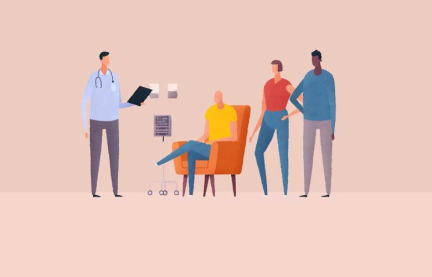When someone dies who means a lot to us, it’s not a case of working out how to eventually ‘let go’ and ‘move on’. It’s more about working out how we can live with the loss, continue relating to the memories of the person who has died, and carry on functioning as friends, parents, partners, work colleagues, neighbours, and so on.
Findings from research tell us that, when we experience bereavement, around 60% of us will benefit from support from our friends, families, community and faith-based networks1.
We may also find it useful to access some information about how we can take care of ourselves as our grief emerges, and how we can learn to express our feelings for the person no longer with us in body. The remaining 40% may need some additional help in their grief.
This can involve peer support groups, individual counselling, access to social media discussions, and many other options.
For decades, face-to-face 1-1 counselling has been seen as the ‘gold standard’ for many. However, times are changing, as we begin to understand more about how different types of support help us in different ways.

The humble telephone
Telephone help for all manner of emotional needs has been available for a long time. The first ever call answered by Samaritans was on the 2nd November 1953 and ChildLine was launched in 1986. Within bereavement support services and prior to the Covid-19 pandemic, most telephone support was similar – brief, single-session, and helpline based. During lockdowns, this changed. Many services providing counselling and on-going grief support turned from giving face-to-face sessions to using the phone. This was out of necessity, and before the use of online video platforms gained popularity.
As lockdowns eased, some bereavement support services returned to providing face-to-face support. For many though, they have continued to provide brief and ongoing multiple session telephone support, over several weeks or months. But why is this?

Shorter waiting times
It seems wrong to have to wait when you’ve finally managed to get to the point of wanting to ask for help. It’s a sad fact, that the number of people in the UK who seek bereavement support outstrips the amount of provision. However, for a bereavement service, it’s easier to deploy trained supporters remotely – to get the help to where it’s needed, quicker. There’s no concern about travel time or expenses for the supporter or the person being supported. It doesn’t necessarily matter where you live. You can provide support and be supported from anywhere, as long as you have a phone line. What’s more, it’s far easier to get someone with a specialist skill set or level of experience, to support someone in need, if they don’t have to travel. This all leads to shorter waiting times.
Establishing rapport
There’s more emerging evidence to state that building rapport and trust is entirely possible with a support relationship that has only existed over the phone2.
Many of us do prefer to see someone in front of us, particularly if we are sharing something delicate or troubling as much of how we communicate is non-verbal.
However, for some people, the phone can seem safer – like a means of protection.
Feeling relatively anonymous can help many people feel less awkward. It can feel more possible to talk about things that seem intimate, if we are a voice communicating to another voice over the phone. Building warmth within a supportive relationship is possible by voice only, and we are now beginning to understand more about the functions of volume, tone, pace of speech and cadence (how our voice varies in rhythm and flow).

Increased accessibility.
The telephone, as a means of support, can open possibilities of access for some groups of people, who might have not otherwise sought out ongoing bereavement support or counselling. This can be because coming to an office or consulting room in another part of town might be impractical. Given the difficult economic situation for many, transport can be unaffordable. Fitting support around a busy life can be a challenge too. For instance, for someone whose partner has died, there can be additional childcare and work responsibilities, that often take priority over individual needs. Becoming increasingly time and income poor is a common experience for those whose partner has died. However, accessing support via phone provides options for fitting support around other aspects of life.
What we don’t know
Whilst there’s quite a body of research around the effectiveness of telephone support, there is very little written specifically about telephone support to grieving people. Given how grief is such an individual experience, it’s important to understand more about how the means we use to communicate, can influence whether someone feels supported or not.
Cruse launched its first outcome report, comparing face-to-face and telephone service clinical outcomes3. One key finding identified that support provided in-person and over the telephone gave very similar results.
More work is forthcoming, as we strive to understand what is particularly helpful for someone, when they are getting support about their grief, over the phone.






Rate and Review
Rate this article
Review this article
Log into OpenLearn to leave reviews and join in the conversation.
Article reviews